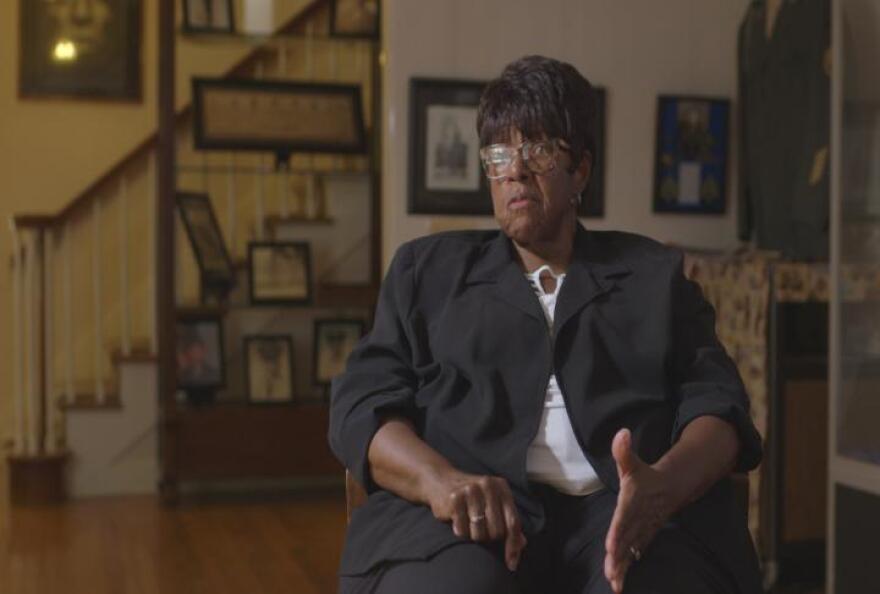Maxine Ray is a folklorist who grew up in the historic African American community of Jonesville, which Western Kentucky University replaced during the urban renewal process of the mid-1950s through late 1960s.
Walking through E.A. Diddle Arena and some of the parking lots that supplanted what was once a thriving Black community of professional masons and homeowners, it's possible to feel the urgency transmitted from Mrs. Ray as she spoke about her work and it's inspiration.
Mrs. Ray attended Western Kentucky University to pursue a degree in Sociology many years after her family and neighbors lost their homes. She would soon find out she had a calling to become a folklorist, as she earned her Master’s Degree from the WKU Folk Studies Program.
Since then, Mrs. Ray has documented, recorded, collected and archived the many stories of her home as she interviewed elders and peers whose roots are ingrained in the Jonesville community.
Mrs. Ray, along with Mrs. Wathetta Buford, felt the urgency to preserve the stories not only of Jonesville, but Black Bowling Green as a whole, and went on to establish the African American Museum of Bowling Green.
A collection of interviews conducted by Mrs. Ray called African American Heritage in Bowling Green and Warren County at WKU's Department of Library Special Collections. Her work to document the story, culture and heritage of Black Bowling Green, specifically Jonesville, as she says, “is so people would never forget.”
The African American Folklorist had an opportunity to sit and speak with Mrs. Ray. An excerpt of our interview is below:
Lamont Jack Pearley: On today's episode, I focus on a notable African American folklorist of Bowling Green who has made a significant contribution by documenting and preserving African American heritage in the bowling green and Warren County area.
Maxine Ray: My name is Maxine Ray. I'm affiliated with the African American Museum, affiliated with the Mount Zion Baptist Church where we go to church. I'm also affiliated with the Folk Studies department at Western.
Lamont Jack Pearley: After changing her major from sociology to folk studies, a class project confirmed Mrs. Ray of the value and importance of her story, family history and the community she grew up in.
Maxine Ray: One day, we had to do a day in our life, like, you know, go take pictures of everything you did that day and go to the dry cleaners or wherever I was stopping. I was out in front of the place taking pictures. And when that turned in my project, I had some pictures of the community that I was born and raised in. I put some of those older pictures in there and say this is kind of what I did as a little girl every day: playing in the neighborhood, going to school, and whatever. And one of my professors asked me, Do you know what you have? I said, Yes, I think I do. I grew up in Jonesville. It was an African American community that was located on the campus of Western. And when everybody would ask me where were you born? And were you born in Bowling Green? And I said, Yes, I was born on Westerns Campus.
Lamont Jack Pearley: So I’m here on a rainy day, walking around the Diddle Arena, through the parking lot around to the back of the arena. A place I've worked at, witnessed exciting sports events, engage with great people. Had I not known I would never have imagined at one time this was a residence for a thriving African American community. And when I say residents, there were homes here.
Maxine Ray: The community was not in existence when it died when Western, wanted to expand.
Lamont Jack Pearley: In my research, I ended up walking down to the corner of Russellville, and University to find the plaque given by the Commonwealth of Kentucky, presented by Western Kentucky University that reads the lives of most residents of this close African American community revolving around church, school and family activities. In the late 1950s. Jonesville was one of the two areas in Bowling Green designated for urban renewal. By 1968, the state had acquired the land and sold it to the university.
Maxine Ray: It was the best place that was all we knew growing up as kids you know, is Jonesville, and you lived here and our parents own property, there were maybe two or three rental properties in that area. But during the late 40s and 50s 55 there were like 67 homes with about four to 500 people living in that community. And then that was when I knew you know that I had some history that needed to be documented and needed to be shared.
Lamont Jack Pearley: When asked what she would like people to receive from her work. She said,
Maxine Ray: Not to forget! Just like you know, walk over the grounds, and just not realize that this was a black thriving community at one time.





